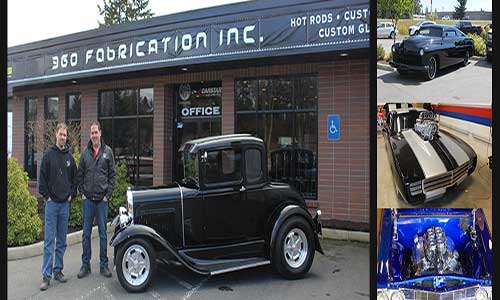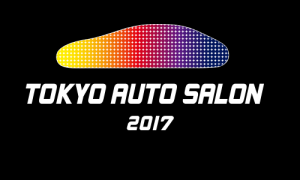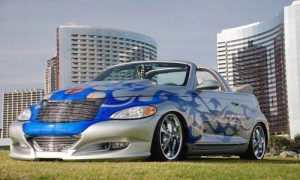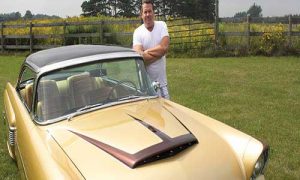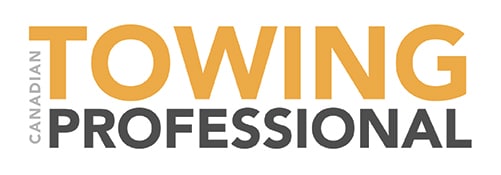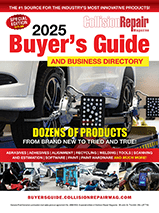The Francouers started in collision, got into customization, and then brought repair back into the fold.
Some people are content with the everyday, the usual, and the mundane. Others feel the need to make changes and value the unique. Rick and Daryl Francouer are in the second category.
The brothers are the owners and operators of 360 Fabrications in Abbotsford, BC. While it’s hard to calculate, volumes seem to indicate that 360 Fabrications is currently the largest custom shop in Canada. Upwards of 70 projects are on the go at any given time.
Like many in the customization and restyling business, Rick and Daryl got their start in the collision repair business.
“Dad worked at a body shop in Port Alberni, on Vancouver Island,” says Rick Francouer. “I started working there when I was 13. I used to have to run two miles to work after school.”
Rick and Daryl decided that customization suited them better, though, so they worked together for a local custom shop in the early 2000s.
“Daryl and I had this huge creative side and there was one particular customer that was begging and pleading for us to go out on our own,” says Rick.
In 2006, they opened 360 Fabrication in a 3,000 sq. ft. facility approximately blocks from their current location. Although starting any new business is stressful, it wasn’t long before signs of success started to appear, in the form of customers.
“We were in the middle of building a crazy truck when we opened. People wanted to come in and take a look,” says Rick. “Soon friends of friends started just dropping their cars off.”
For the next few years, business grew, their name recognition improved and things were going well. The brothers had expanded already by opening up an upholstery division and an audio division.
In a few short years, their business was booming, employing upwards of 40 staff, all on deck to customize the vehicles brought to the business by hockey players, rock stars, and corporate high-rollers.
Rick says that their success in custom cars was always in large part to their knowledge of collision repair.
“We apply all of the rules of the collision repair business to building custom cars,” says Rick. “We build better cars, and we build them faster.”
Collision repair may be in their blood, but Daryl Francouer knows they’ve got custom blood in their veins as well.
“I built and designed a custom race boat when I was 15,” says Daryl. “Kind of a strange thing to do, but growing up on a lake, I just wanted the fastest and best boat around.”
He eventually got it up to 200 hp, so there’s a pretty good chance he hit the “fastest” mark. Daryl sold the boat to get funds so he could attend the University of Northern British Columbia for aircraft engineering. Oddly enough, he may have hit the “best” mark as well.
“That was 25 years ago, but the boat still exists,” says Daryl. “Rick spotted it recently. It’s nice to see it didn’t fall apart.”
Daryl spends his days as the Production Manager for 360 Fabrications, and his nights working on a personal customization project. Hearing that a professional customizer is working on a personal project conjures up many different mental images. Perhaps it’s a pedal-to-the-metal sports car with custom body work and paint, or a reborn classic with a chopped roof and sumptuous interior fittings. That’s what Daryl does at his day job, though. For his personal project, he’s aiming a little higher.
Okay, a lot higher: his personal project is a 1942 Grumman Widgeon, a flying boat of the same type that was featured on the TV show Fantasy Island.
“It was last flown in 1959, so there’s a lot of work to do,” says Daryl, who is himself a qualified pilot. “The exterior is mostly a restoration job, but the interior is where I’m putting in most of the work. I’m modifying it to be closer to today’s jet standards.”
This is partly a matter of creature comfort, but also includes modern instrumentation and controls. As Daryl says, “It makes flying long distances a lot more comfortable and safer.”
Needless to say, he’s also installing more modern engines to provide more horsepower.
On the shop floor, Daryl’s job comes down to making sure the customer gets what they want. A lot of the time this involves helping the customer figure out exactly what it is they do want.
“Everyone wants quality. People work hard for their money, and you have to respect that,” says Daryl. “But you can over-restore or under-restore a car. Plus a new customer may think they know exactly what they want, and they can describe it to you. Then you point out that it will cost about $100,000 and they find they don’t quite want that anymore.”
It’s funny, but it’s also a fact: what the customer wants is very strongly affected by what they can afford. Part of Daryl’s job is walking them through every step of the process, showing them what it will cost, and modifying the job until it’s on point for both effect and price.
Daryl has some recommendations for anyone who is interested in professional customization. First, spend some time as a body tech.
“I know people aren’t modifying their cars quite as much as they used to, but learning how to change quarter panels is a good start,” he says. “The basics are very important, and those are skills you can take with you.” However, he notes that there are skills that most collision technicians don’t have the opportunity to pick up at their day job.
“Very few shops have a metal shop, so today’s techs don’t often bend metal or fabricate,” he says. “If you want to customize, you’ve got to be fairly well rounded in your ability to bend metal and weld it up. You’ve got to have an artistic streak and a design in mind. If you’ve got a flair for design, start by practicing on your own cars.”
A few years back, the Francouers returned to the collision world with the purchase of a CARSTAR franchise. CARSTAR 360 operates out of the same building as 360 Fabrication, and the two businesses occasionally share staff.”
“The two shops definitely work hand in hand,” says Rick. “The neat thing is that we’ve made ourselves hard to compete against we are so diversified.”
CARSTAR 360 is often given the job of repairing badly damaged custom or rare cars. They have the ability to build parts that they can’t order, and they have obvious experience dealing with custom cars generally.
In both collision and customization, quality of work is incredibly important. The main differences are that customization can be much more expensive, and there’s no insurance company paying for it. Every single dollar that goes into the job comes out of the customer’s pocket.
“Customers expect quality on their new cars. They expect it on their ’69 Camaros 10 times over,” says Daryl. “Working on older cars isn’t to be taken lightly.”
For both body techs and painters, Daryl recommends patience and practice, practice, practice.
“You may spend 200 hours painting a custom vehicle,” he says “You need patience and a passion for quality. You also need passion for the work itself. If you’ve got that, and you have the basic skills, it’s just a matter of practice.”





